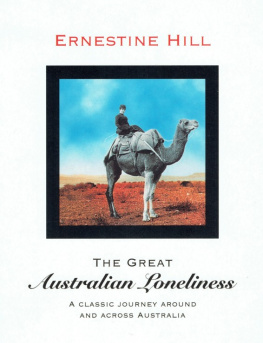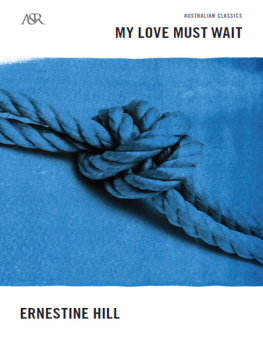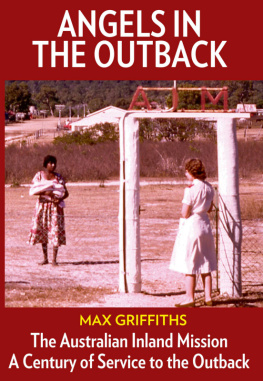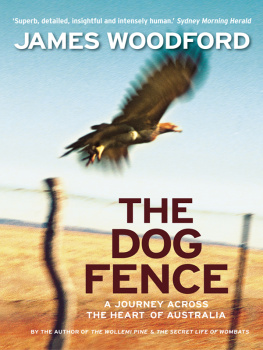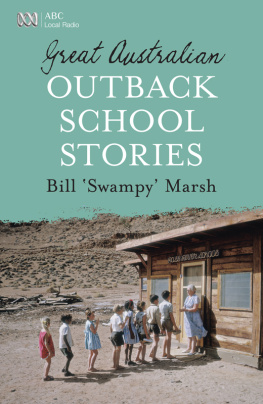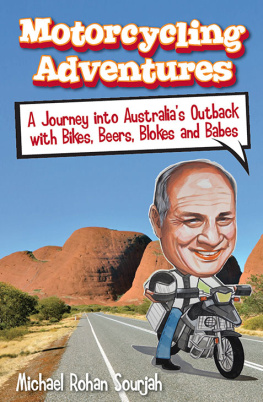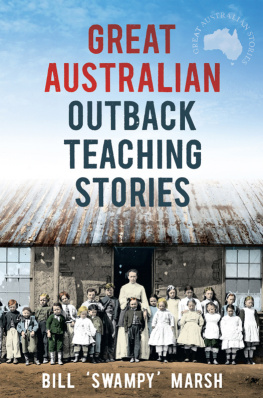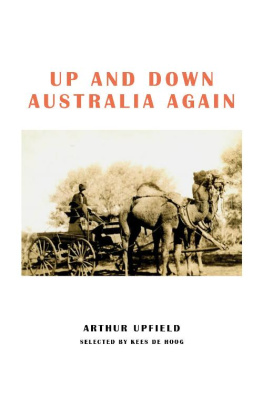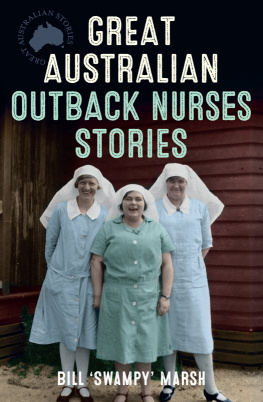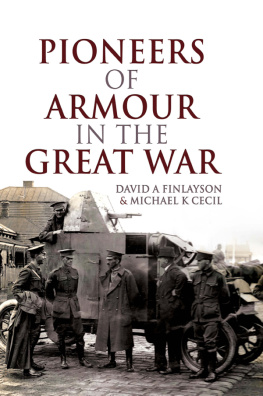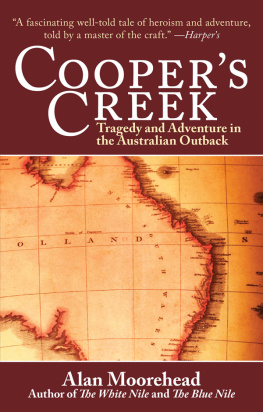Ernestine Hill was born in 1899 in Rockhampton, Queensland. She worked as a journalist, but when her husband died in 1933 she embarked on a life of almost continual travel and writing. Her first book, The Great Australian Loneliness, was published in 1937, and met with great success. A strongly visual account of outback travel, it had the added interest of being from a woman's perspective at a time when such publications were rare. It was followed by Water into Gold. Hill also wrote a novel based on the story of Matthew Flinders, My Love Must Wait, published in 1941. Apart from Flying Doctor Calling (1947), based on the work of the Inland Mission, her best-known book is The Territory (1951), a vivid and accurate chronicle of travelling in the Northern Territory. Ernestine Hill died in 1972.
For the co-operation and most kindly consideration that have helped me through the long pilgrimage, my thanks are due to The Advertiser, Adelaide; Sun Newspapers, Sydney; West Australian, Perth; Herald, Melbourne; Courier-Mail, Brisbane; Sydney Morning Herald; Sydney Mail; Melbourne Argus; and the Australian National Travel Magazine, Walkabout, in which my writings have appeared.
ERNESTINE HILL.
FOREWORD
THIS is the story of a journalists journey round and across Australia, far from the rhythm of the big machine and the sameness of cities.
A magnificent empty land; of six and a half millions of its children, six millions set their lives and their watches to the clanging of the tram-bells and the train-whistles. The odd half-million share three-quarters of the Continent between them, and tell the time in months and years.
It was in July, 1930, that I first set out, a wandering copy-boy with swag and typewriter, to find what lay beyond the railway lines. Across the painted deserts and the pearling seas, by aeroplane and camel and coastal-ship, by truck and lugger and packhorse team and private yacht, the trail has led me on across five years and 50,000 miles, a trail of infinite surprises.
Many a time have I unrolled the little swag by creek and sandhill, alone in the silence and starlight with a white man and a black. I have interviewed men living in wurlies of paper-bark who read Gibbon and wrote Greek and danced in corroboree; witch-doctors of the Warramunga and the Kulukularagudu in their own national costume, which was minus, and pidgin; lepers and the dying, deep-sea divers and prospectors for gold, and white women fighting the splendid battle of the pioneers, rearing their children in bough shades in the wilderness.
With never a step outside the three-mile limit in a purely British country, I have attended Japanese Feasts of Lanterns, Chinese banquets, blackfellow burials and Greek weddings, and turned to the west with the Mussulmans when they knelt on their prayer-mats to Allah at the call of the muezzin. Many of the notes have been taken by the flickering of a camp-fire; many of the pictures developed by the port light of a lugger, or with a bit of blackfellows turkey red wrapped round a hurricane lamp in the bush, the films washed in a billabong or hung to dry on a tree.
The typewriter has always been with me, dangling from a camel-saddle, jingling on a truck, covered with a camp-sheet in the rains. On anything that came along, I followed the story. It was all in a journalists job, and it was all good hunting.
Australia is like its own unique and glorious jewel, the opal. A great jagged square of colourless crystal, you must hold it up to the light to catch the flashing fires of romance.
Dreaming in a little ship down the crocodile-infested reaches of tropic rivers; out on the stark sandhills of the Centre, where the bones of the diprotodon and notatherium lie white in the sun; by miners tents of the infinite mineral hills; or sitting on a petrol tin in the din and dust of corroboree, so have I learned a little of the amazing private life of this Australia, still a stranger to the world and to its own people. To quote the oath, as administered to native witnesses in courts of the North:
No more gammon, no more lie,
I been see him, longa my eye.
Leaning out of an aeroplane, I have looked upon the limitless wastes of the spinifex stretched out like a snakeskin 8,000 feet below me. From the ruby headlands of the North-west, I have watched a fleet of eighty luggers set forth for the pearling-grounds, their sails like opening lilies in the dawn-light. I have lived for a week in a cave, with the opal-mining troglodytes of central deserts, followed breathless in the wake of a gold rush, and battled on a 26-ton ketch in the south-east trades, 1,500 miles across the empty wind-swept waters of Carpentaria, sleeping on deck with a goat for company.
The adventure is over. But my heart is out there for good. Always, across the city lights, I shall be seeing the glitter of blacks fires in the ranges, hearing through the roar of the traffic the ghostly echo of pack-bells, and telling over in memory the names of that lost legion, to whom I was but a swiftly-passing pilgrim, but to whom they gave of their best.
It is their unfailing chivalry and kindliness that have made these journeyings of a lone woman not only possible, but one of the happiest memories of life. Therefore, to the men and women of the Australian outback, and to all who take up the white mans burden in the lonely places, I dedicate this book.
ERNESTINE HILL.
CONTENTS
Ports of Sunset
I.
II.
III.
IV.
V.
VI.
VII.
VIII.
IX.
X.
XI.
XII.
XIII.
Royal Mantle of the Tropics
XIV.
XV.
XVI.
XVII.
XVIII.
XIX.
XX.
XXI.
XXII.
XXIII.
XXIV.
XXV.
XXVI.
The Living Heart
XXVII.
XXVIII.
XXIX.
XXX.
XXXI.
XXXII.
XXXIII.
XXXIV.
XXXV.
XXXVI.
XXXVII.
XXXVIII.
XXXIX.
BOOK I
PORTS OF SUNSET
CHAPTER I
A MORNING SPIN
OF course youll take a gun, they said to me when I left Melbourne, even if its only one of those little mother-of-pearl things the vamps used to carry in their evening-bags. Apart from wild blacks there will be crocodiles, and Malays running amok, and men that havent seen a white woman in thirty years. There might be three hundred miles of desolation on a truck with a drunken Afghan, and youll be alone in the night-time, in those pearling-towns of sand and sin, with a half-caste woman keeping the shanty
Yes, I reflected, I had better take a gun.
One morning in a Perth hardware store they showed me a whole armoury, from double-barrelled Savages and .303s down to a baby automatic guaranteed not to go off in the pocket. My particular fancy, which was something in the nature of a fountain-pen, nail-file, pen-knife and revolver, swivelled together in a little nickel case, they had not yet in stock.
Do you shoot to kill? the shopman asked me casually.
I only want something to brandish in moments of peril, I laughed.
Then dont take it, he advised. Nobody that hasnt a definite target in mind should ever buy a gun.
At the last moment, apprehensive still, I consulted a leader and organizer of the Australian Inland Medical Mission, a man who had travelled the continent for ten years, perpendicularly, diagonally and in circumference, by air and car and donkey team.
Believe me, he said earnestly, a nursemaid could wheel a baby in a perambulator across Australia with far less danger of being molested than in any city park. It would be a ridiculous insult to the finest people in the world, and you would be the joke.
So it was without any more desperate precaution than a badly sharpened lead-pencil that I booked my ticket with Western Australian Airways and set out, unknown into the unknown, to meet the people of the real Australia, and to find that, black and white, they were all friends. Many a time, making one among them in the wilderness, I have looked back to the gun episode, and have scarcely known whether to laugh or to cry. All that I can plead is that, with the other six million post-office clock Australians, I knew nothing whatever about them.
Next page
